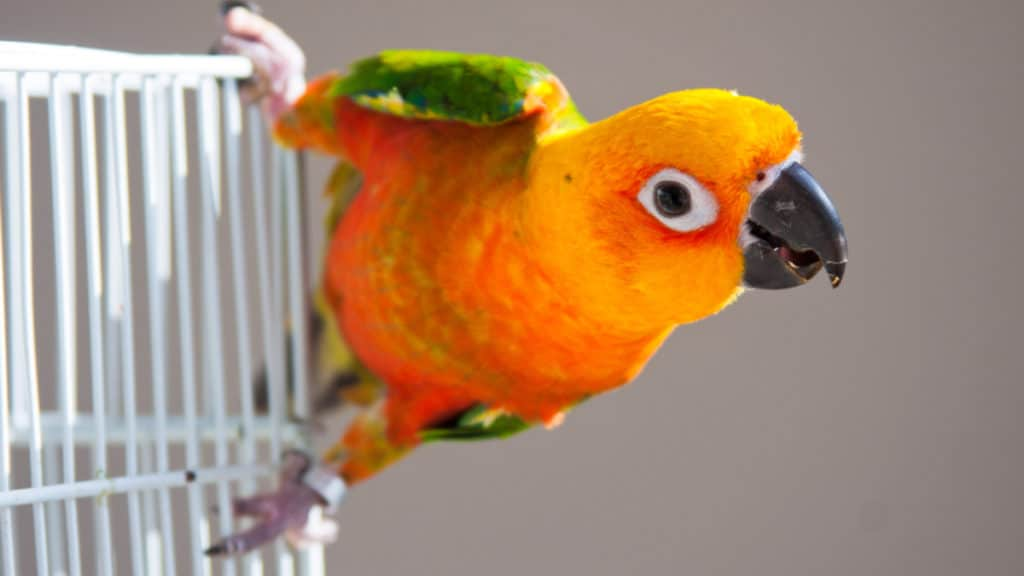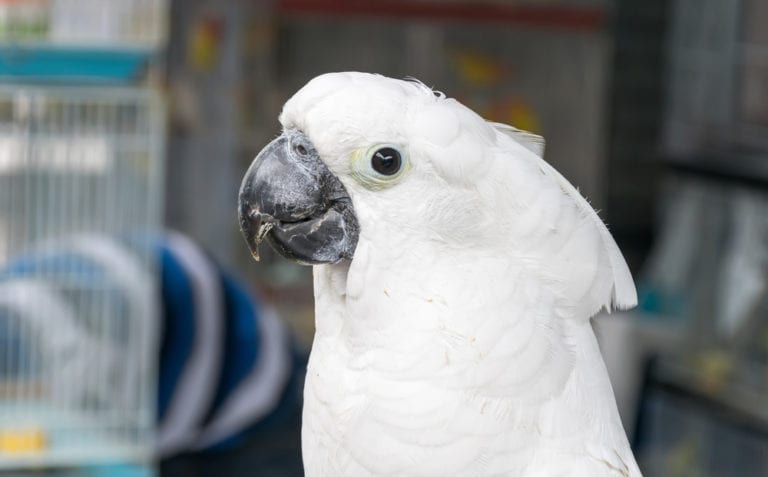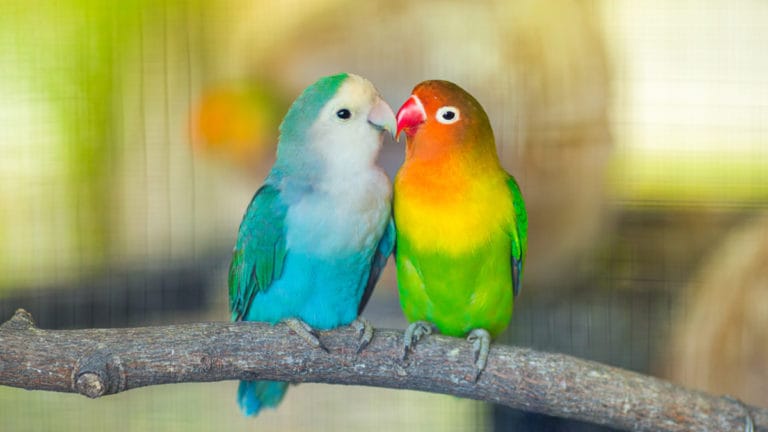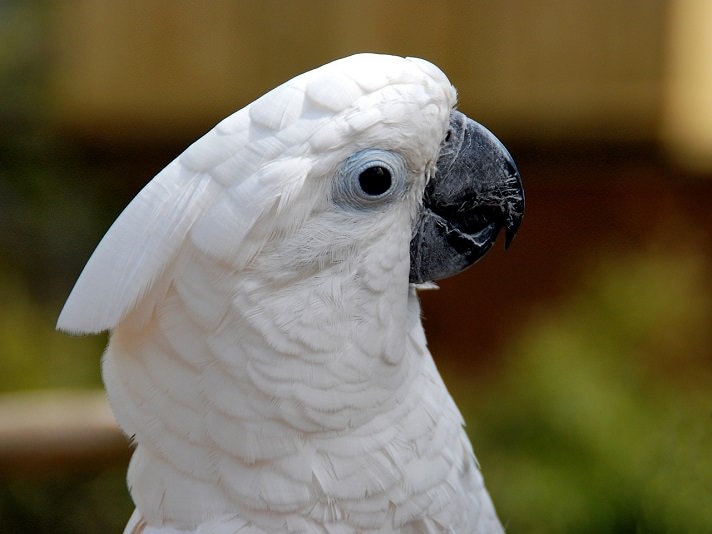Our misinterpretation of a parrot’s behavior is one of the major causes of problems with the people/parrot relationship. I hear lots of rules and absolutes about parrot behavior, but I believe there is one golden rule in understanding our pet birds: Parrots are more comfortable with people who are comfortable with them.
When people call me for a parrot behavior consultation, there are two things I hear quite frequently. The first is, “My bird suddenly turned mean,” and the other is, “My bird hates me.” The choice of words depends on how people interpret the fact that their bird has either been aggressive with them or suddenly wants nothing to do with them. Both statements are rarely, if ever, what is really going on.
People tend to take the changes in their parrots’s behavior personally, and they also interpret these changes as if parrot logic is the same as ours. While it is true that there are occasionally situations when a parrot genuinely wants nothing to do with an individual, it is very rare for a parrot to suddenly “hate” someone it has previously trusted.
Many times, a parrot changes its behavior toward its owner because it is no longer comfortable with that person. Something happened that is confusing the parrot, and this changes its reaction to its caregiver. This then changes the person’s behavior toward the parrot. The more reactive the person is toward the parrot’s behavioral change, the more the cycle continues. The person changes his or her behavior toward the parrot, the parrot changes behavior toward the person and on and on until the relationship is almost lost. I say almost, because I have worked with many people who have been able to rebuild a trusting relationship with their birds.
Check Your Stress Levels Before Interacting With Your Parrot
There are a few basic reasons that a parrot is no longer comfortable with a person it was previously comfortable with. Parrots have a difficult time with our energy when we are frustrated, depressed, angry or aggressive.
A husband and wife who I worked with both had long commutes in the San Francisco Bay Area. The woman arrived home about a half an hour before her husband, so she would get their African grey’s parrot bird food ready. By the time the husband came home, the bird had eaten and was in the mood for attention. The man loved and enjoyed the parrot, but he was stressed after his commute. He would often approach the bird in this manner, and it had reached the point that the bird didn’t want anything to do with him. It really frustrated him that the parrot’s strong bond had transferred to his wife.
My advice was for him to greet the African grey when he walked in the door but, other than that, he should ignore him until he could slow down his energy and relax. He could then approach the African grey and interact with him.
For various reasons, people can be very capricious, and companion parrots thrive on predictability in their relationship with us. Our parrots can adjust to a certain amount of mixed messages in their lives, but the more unpredictable we are with them, the more unpredictable they are with us.
I worked with a couple who adored their rose-breasted cockatoo, but the man was a heavy drinker, which often made his behavior unpredictable. At some point, the cockatoo became terrified of him. There is no doubt in my mind that the rose-breasted cockatoo couldn’t relate to his owner’s mood swings. The man believed the bird hated him and couldn’t understand that the bird was reacting to his unpredictable behavior. There were times when he might have been aggressive with the bird and did not realize it. Aggression can easily change a companion parrot’s trust level.
What Has Changed?
If someone approaches his or her parrot in a really negative mood, the pet bird will not want to be handled. In this type of situation, if the person insists, it is likely that the pet bird will either be aggressive or afraid, and both can lead to a bite. Another possibility is change in the physical environment or the appearance of the caregiver. Parrots are detail oriented, and even the smallest change can cause them confusion until they become used to it.
Years ago, a man called me because his African grey no longer liked him. I asked him if anything had changed, and he couldn’t think of anything. I told him to just relax, not make any demands on the bird and to approach him slowly in a somewhat submissive manner. I advised him to take a few slow, deep breaths, lower his head and make very little eye contact. About a week later, he called me back and sheepishly told me that there was an obvious change that hadn’t occurred to him. He had shaved the moustache, which he had long before the grey came to live with him. He followed my advice and, after a few days of getting used to his clean-shaven caregiver, the grey started to relax with him.
I have talked to dozens of people who have made sudden changes in their appearance, like a new hair style or color, new glasses or less facial hair, and their birds have responded to them as if they were strangers. If the person relaxes with the bird, it usually only takes a few days at most for the parrot to realize that the person is, indeed, their long-time friend.
Parrots See What We Can’t
When I first started working with parrots, I was very puzzled about an aspect of their behavior. Actually, I was puzzled by many aspects of their behavior, but the fact that they formed almost immediate likes and dislikes made me very curious. It was not always the same thing that triggered their negative reaction toward people. For example, my caique, Spike, seems to judge people immediately. Generally, he will not like a person if I am uncomfortable with them. He also usually does not like baseball hats and will have a negative reaction to anyone wearing one. Other than that, it seems to have little to do with the person’s gender or clothing.
After thinking about Spike’s immediate reaction toward people, it became evident that it was the person’s energy. I noticed that most parrots don’t like someone who is too direct or someone who is afraid of them. This was interesting to me. How could they observe that energy so well when I couldn’t usually tell who parrots are going to like and who they would dislike? More than 30 years ago, a friend suggested that parrots can see our auras. Their perception seemed so subtle that I couldn’t disagree with her. There is now information that solves the puzzle.
Parrots have incredible vision. They have four cones for color vision, while we only have three. This means they see in ways that we will never be able to. They also see the ultra-violet color range, which means that they see colors in a very different way than we do. The amazing aspect to this is that they can actually see our energy by the capillary action in our faces. They can see if we are comfortable with them before we do anything that could be interpreted by people.
The fact that they can actually see our energy is the main reason I encourage people to take a slow breath and relax before they pick up their parrot, especially if they are stressed or upset. I figured this out many years ago when I was asked to tame a wild-caught military macaw. The imported bird was in quarantine and then purchased by a pet shop. He had been there in a cage for three years without anyone trying to handle him. The employees called him “slasher” because anytime anyone came near him, he lunged at them. Everyone was afraid of him and approached him with fear every time they changed his food and water.
When I met the macaw, I knew he would be a challenge because, frankly, he scared me. It was really difficult to get him out of the cage. We had to use a towel, stick and gloves, which I hardly ever use because these items often frighten a bird. He bit me to the bone on my index finger, but I wanted to go ahead and work with him because I didn’t want to have to take him out again. I prepared a back room to work with him, so as soon as I had him in a towel, I took him there. I sat on the floor with him on my lap still in the towel and slowed down my energy and started scratching his head. Within 10 minutes, I unwrapped him and he was on his back in my lap while I scratched him all over.
Mutual preening is an important part of a parrot’s relationship with other birds. Once he matched my relaxed energy, it was clear to me that he trusted me. Within a few more minutes he was sitting on my hand while I was petting his head. The key to the whole situation was that I was able to slow down my energy, so he sensed no aggression or fear from me. This was an epiphany for me, and I have used a calm energy to tame and re-tame many parrots ever since.
Lower Your Energy Around Your Parrot
In another situation, I did a consultation with a red-bellied parrot that was very fearful of his caregiver. She brought the bird to my shop in a carrier, and the first words out of her mouth were, “This bird hates me!” Of course, the bird didn’t hate her, but he was clearly afraid of her. My guess is that she had tried all the wrong things and was so frustrated that the parrot became even more wary of being around her. Many people worsen the fear in a phobic bird by being too direct or demanding. Since parrots are prey animals, it is easy for them to become afraid of people with an aggressive or direct energy, especially if the bird is already threatened for some reason.
I had the woman put the open carrier on the end of the couch where I was sitting, and she sat in a chair across from the couch. As we talked, I lowered my head and made eye contact with the bird for no more than a second or two. Then I would slowly look away. I did this for a few minutes, and the parrot walked out of the carrier toward me. I continued with my lowered energy and my submissive behavior and, within a few more minutes, the bird was being a love and snuggling into my neck. Her response was, “OK, he likes you, but he still won’t like me.”I was teaching her the techniques that she could use to get the red belly to like her.
I advised her to place a chair at the front of the bird’s cage, open the cage door and lean into the opening without even making eye contact with the parrot. I told her to sit on the chair and read a magazine and occasionally look at the parrot with a quick glance and then lower her head slowly and look away to read the magazine. This way she was giving the bird an invitation to join her without being too direct, which would worsen the parrot’s fear of her.
Parrot Yearning For A Flock
Parrots want and need companionship; however, if a person’s energy is confusing or frightening, the bird will not be comfortable with that person. We need to keep in mind that it is our responsibility to try to understand why our parrot no longer feels comfortable with us. As intelligent as parrots are, they don’t understand how to mend problems in their relationships with us.
If it suddenly seems as though your parrot “hates you,” don’t take it personally. Stop and think if the bird is reacting to your negative energy or something you are doing. Has there been a change in its environment or in your appearance? When a parrot’s behavior suddenly changes, talk to your avian veterinarian to make sure that the problem isn’t health related. Most of all, don’t react to one negative incident in a way that damages your parrot’s trust in you.
A single bite does not mean that a parrot has turned mean or that the bird is even turning into a biter. It is up to us to keep a single incident from turning into a pattern. I don’t believe that parrots give us unconditional love. I believe we have to continually relate to our companions in trust-building ways to earn their love from day to day.
Learn More About Bird Body Language:
Posted by: Chewy Editorial
Feature Image: Lorcel/Shutterstock.com
Share:









